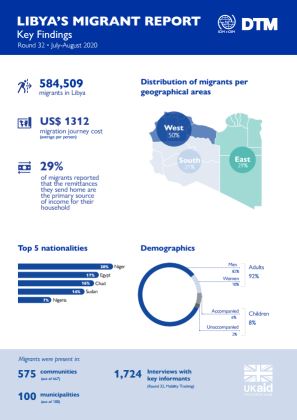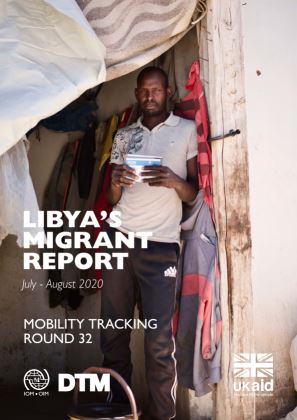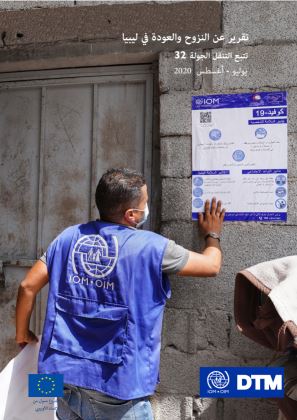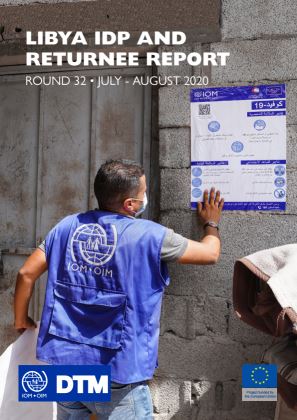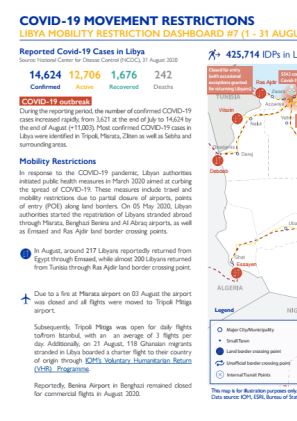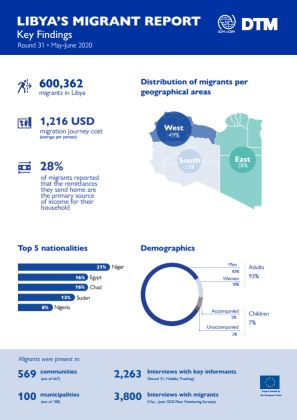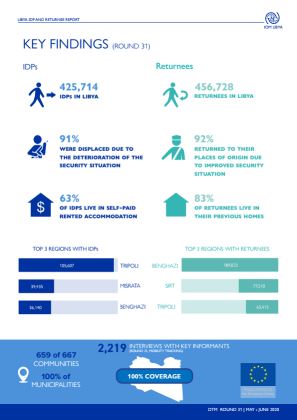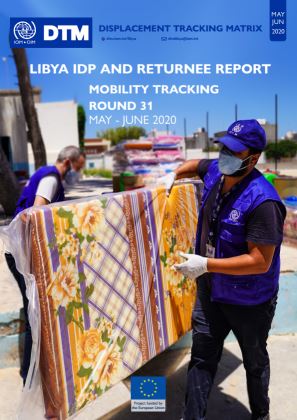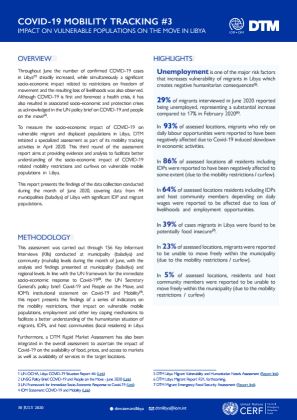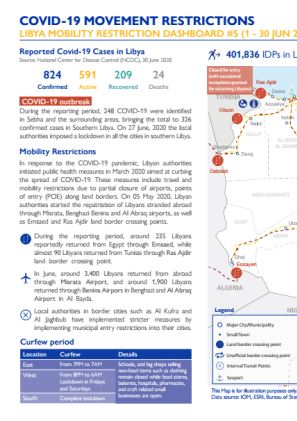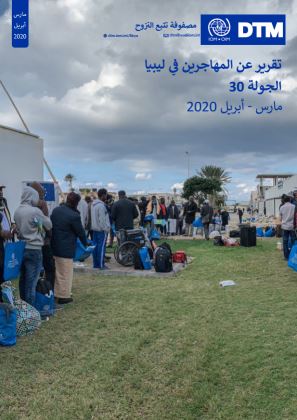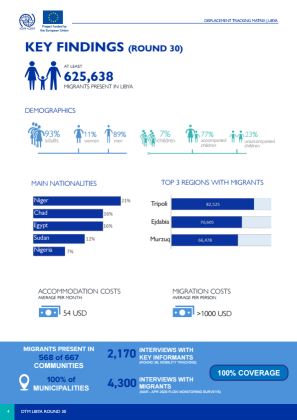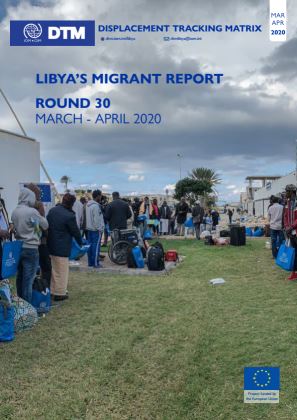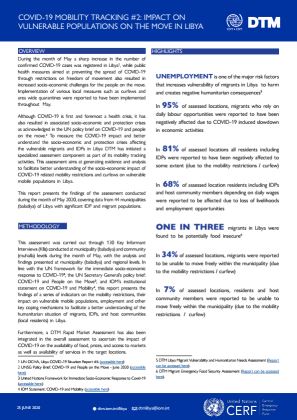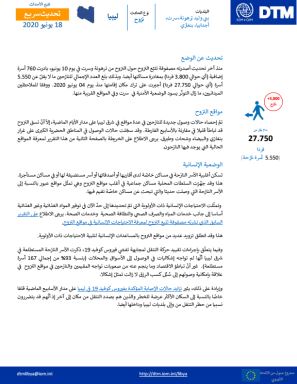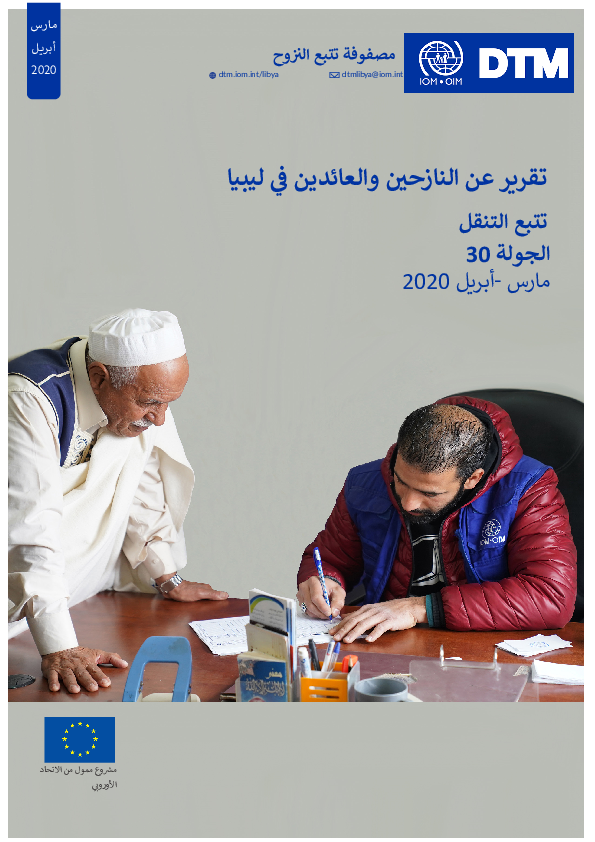-
Countries
-
Data and Analysis
-
Special Focus
-
Crisis Responses
Libya
About Libya
Libya is a geographically vast country with several regions that are difficult to access. In order to understand the full scope of humanitarian assistance that is needed throughout the country, IOM established the Displacement Tracking Matrix (DTM) programme in 2016 in order to provide a common operating picture concerning the movement of populations in Libya, allowing humanitarian actors to provide timely assistance to those in need. Following the escalation of conflict and insecurity in 2014, the security situation has remained volatile since with fluctuations in the intensity of localized clashes. Congruently, conflict has caused new displacements, often in areas ill-equipped to accommodate large population movements while also negatively impacting the large migrant population residing and transiting through Libya. More recently, the capital Tripoli was heavily affected by displacement waves in September 2018 and April 2019.
DTM’s mobility tracking and flow monitoring activities identified many migrants in-country to be in need of various forms of assistance. Libya’s geographic location, resources and work opportunities has made it both a country of destination and transit for migrants for many years. Despite the deterioration of the security situation since 2011 migrants continue coming to and transiting through Libya, the majority from Sub-Saharan and North African countries.
In this complex operating environment, DTM Libya has been providing a common operating picture concerning the movement of populations in Libya since 2016, allowing humanitarian actors to provide timely assistance to those in need. Through its mobility tracking, flow monitoring and needs assessment activities, DTM Libya has established itself as data hub for quantitative data on migratory flows to and within Libya, migrant presence in Libya disaggregated by nationality and area, as well as humanitarian needs of migrants, internally displaced population and returnees. All activities are implemented through periodical bi-monthly data collection cycles, allowing trend analysis over time to provide evidence-base for both policy-level discussions and to guide humanitarian action.
In order to facilitate humanitarian interventions, DTM works closely with IOM’s other programmes through referring identified populations in need of assistance at flow monitoring points to IOM’s Direct Assistance, Health, Voluntary Humanitarian Return (VHR), Protection and Migrant Rapid Response Mechanism (MRRM) programmes. Furthermore, DTM Libya supports other humanitarian partners through providing emergency tracking updates in case of sudden population movements as well as facilitating humanitarian assessments for the Rapid Response Mechanism (RRM) jointly implemented by IOM, UNICEF, WFP and UNFPA.
For more information on IOM's activities in Libya, please visit the IOM Libya country office website.
Contact
DTM Libya
DTMLibya@iom.int
Current Donors
- EUTF
Migrant Report Key Findings Round 32 (July-August 2020)
Migrant Report Key Findings Round 32 (July-August 2020)
Libya — Migrant Report 32 (July-August 2020)
This report presents the findings of DTM Round 32 (July and August 2020) data collection, in which 584,509 migrants of over 47 nationalities were identified in Libya. Migrants’ presence was recorded in all 100 Libyan municipalities and in 575 (out of 667) communities (muhallas).
Sep 23 2020
Libya — Migrant Report 32 (July-August 2020)
Libya — IDP & Returnee Report, Round 32 (July-August 2020) [Arabic]
يستعرض هذا التقرير نتائج الجولة الثانية والثلاثين المستخلصة من عمل وحدة تتبع التنقل الخاصة بمصفوفة تتبع النزوح في ليبيا والتي تغطّي الفترة الممتدة بين شهري يوليو وأغسطس من سنة 2020.
Sep 22 2020
Libya — IDP & Returnee Report, Round 32 (July-…
Libya — IDP And Returnee Key Findings Report 32 (July-August2020)
This report presents the Key findings of Round 32 of the mobility tracking component of the Displacement Tracking Matrix (DTM) programme in Libya.
Libya — IDP & Returnee Report, Round 32 (July-August 2020)
This report presents the findings of Round 32 of the Mobility Tracking component of IOM Libya’s Displacement Tracking Matrix (DTM) programme, covering the reporting period from July to August 2020.
Sep 21 2020
Libya — IDP & Returnee Report, Round 32 (July-…
Libya — Mobility Restriction Dashboard 7 (01 - 31 Aug 2020)
During the reporting period, the number of confirmed COVID-19 cases increased rapidly, from 3,621 at the end of July to 14,624 by the end of August (+11,003). Most confirmed COVID-19 cases in Libya were identified in Tripoli, Misrata, Zliten as well as Sebha and surrounding areas.
Migrant Report Key Findings Round 31 (May- June 2020)
Migrant Report Key Findings Round 31 (May- June 2020)
Libya — Migrant Report 31 (May- June 2020)
This report presents the findings of DTM Round 31 (May-June 2020) data collection, in which at least 600,362 migrants of over 46 nationalities were identified in Libya. Migrants’ presence was recorded in all 100 Libyan municipalities and in 568 communities (muhallas).
Aug 17 2020
Libya — Migrant Report 31 (May- June 2020)
Libya — Mobility Restriction Dashboard 6 (01 - 31 July 2020)
During the reporting period, the number of confirmed COVID-19 cases in Libya more than quadrupled in July, increasing from 824 to 3,621 confirmed cases (+2,797). The majority of new COVID-19 cases were identified in Tripoli, Sebha and Misrata.
Libya — IDP & Returnee Report, Round 31 (May-June 2020) [ARABIC]
يستعرض هذا التقرير نتائج الجولة الواحدة والثلاثين المستخلصة من عمل وحدة تتبّع التنقل الخاصّة بمصفوفة تتبع النزوح في ليبيا والتي تغطّي الفترة الممتدة بين شهري مايو ويونيو من سنة 2020 . وخلال هذه الجولة، ارتفع عدد النازحين داخليا في ليبيا من 401.836 نازحا إلى 425.714 نازحا.
Aug 13 2020
Libya — IDP & Returnee Report, Round 31 (May-J…
Libya — IDP And Returnee Key Findings Report 31 (May-June 2020)
This report presents the Key findings of Round 31 of the mobility tracking component of the Displacement Tracking Matrix (DTM) programme in Libya.
Libya — IDP & Returnee Report, Round 31 (May-June 2020)
This report presents the findings of Round 31 of the Mobility Tracking component of the Displacement Tracking Matrix (DTM) programme in Libya, covering the reporting period from May to June 2020.
Aug 13 2020
Libya — IDP & Returnee Report, Round 31 (May-J…
Libya — Detention Centre Profile Generator (July 2020)
Detention Centre Profiling is a component of IOM Libya’s Displacement Matrix programme.
Libya — COVID-19 MOBILITY TRACKING 3 (June 2020)
DTM COVID-19 impact assessment is implemented as part of the Mobility Tracking activities aimed at understanding the socio-economic impact of mobility restrictions and curfews on the vulnerable people on move in Libya.
Jul 30 2020
Libya — COVID-19 MOBILITY TRACKING 3 (June 2020)
Libya — Detention Centre Profile Generator (June 2020)
Detention Centre Profiling is a component of IOM Libya’s Displacement Matrix programme.
Libya — Mobility Restriction Dashboard 5 (01 - 30 June2020)
During the reporting period, 248 COVID-19 cases were identified in Sebha and the surrounding areas, bringing the total to 326 confirmed cases in Southern Libya. On 27 June, 2020 the local authorities imposed a lockdown in all the cities in southern Libya.
Libya — Migrant Report 30 (March - April 2020) [Arabic]
يعرض هذا التقرير مستخلصات الجولة 30 من تجميع البيانات التي قادتها مصفوفة تتبع النزوح (خلال الفترة ما بين شهري مارس وأبريل من سنة 2020) والتي أحصت من خلالها ما لا يقل عن 625.638 مهاجر ينحدر أصلهم من أكثر من 44 بلدا موجودين في ليبيا.
Migrant Report Key Findings Round 30 (March - April 2020)
Migrant Report Key Findings Round 30 (March - April 2020)
Libya — Migrant Report 30 (March - April 2020)
This report presents the findings of DTM Round 30 (March- April 2020) data collection, in which at least 625,638 migrants from over 44 countries of origin were identified in Libya.
Jun 29 2020
Libya — Migrant Report 30 (March - April 2020)
Libya — COVID-19 MOBILITY TRACKING 2 (May 2020)
DTM COVID-19 impact assessment is implemented as part of the Mobility Tracking activities aimed at understanding the socio-economic impact of mobility restrictions and curfews on the vulnerable people on move in Libya.
Jun 25 2020
Libya — COVID-19 MOBILITY TRACKING 2 (May 2020)
Libya — Bani Waleed, Tarhuna, Sirt, Ejdabia, Benghazi Flash Update 4 (18 JUNE 2020) [ARABIC]
منذ آخر تحديث أصدرته مصفوفة تتبّع النزوح حول النزوح من ترهونة وسرت في يوم 10 يونيو، بادرت 760 أسرة إضافية (أي حوالي 3.800 فردا) بمغادرة مساكنها أيضا. وبذلك بلغ العدد الإجمالي للنازحين ما لا يقلّ عن 5.550 أسرة (أي حوالي 27.750 فردا) أجبرت على ترك مكان إقامتها منذ يوم 04 يونيو 2020.
Libya — Bani Waleed, Tarhuna, Sirt, Ejdabia, Benghazi Flash Update 4 (18 JUNE 2020)
Since DTM’s last update on displacement from Tarhuna and Sirt on 10 June, an additional 760 displaced families (approximately 3,800 individuals) were identified, bringing the total of internally displaced persons to at least 5,550 families (approximately 27,750 individuals) who have been forced t
Libya — Detention Centre Profile Generator (May 2020)
Detention Centre Profiling is a component of IOM Libya’s Displacement Matrix programme.
Libya — IDP & Returnee Report, Round 30 (Mar-Apr 2020) [ARABIC]
ستعرض هذا التقرير نتائج الجولة الثلاثين المستخلصة من عمل وحدة تتبّع التنقل الخاصّة بمصفوفة تتبع النزوح في ليبيا والتي تغطّي الفترة الممتدة بين شهري مارس وأبريل من سنة 2020. وخلال هذه الجولة، ارتفع عدد النازحين داخليا في ليبيا من 373.709 نازحا إلى 401.836 نازحا.
Jun 10 2020
Libya — IDP & Returnee Report, Round 30 (Mar-A…
Pagination
Pagination
- First page
- Previous page
- 1
- 2
- 3
- 4
- 5


